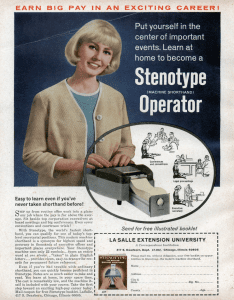A court reporter is a highly trained professional who works to ensure accurate documentation of a courtroom proceeding. As we’ll soon discuss, this plays an integral role in the trial’s outcome more often than you might expect.
We’ve all seen movies with dramatic courtroom showdowns. In many cases, the court reporter reads back testimony providing a “gotcha” statement that turns out to be the story’s climax. While real court cases seldom play out so compellingly, the work of court reporters is often the turning point of a case. On the surface, these highly trained, highly skilled professionals work to ensure accurate documentation of a courtroom proceeding. As we’ll soon discuss, this plays an integral role in the trial’s outcome more often than you might expect.
What a Court Reporter Does
Court reporters Seattle are trained in stenography, the practice (or art) of providing real-time transcriptions of dictation or testimony. They use an efficient shorthand that allows them to truncate words, phrases, and sentences to ensure speedy availability of transcripts for the court record.
Code of Ethics
The National Court Reporters Association is an organization to which many successful court reporters belong. This governing body sets a standard code of ethics for court reporters that emphasizes impartiality and focus on the objective task. Those who are members are trained and expected not to show favor to either party in a case, and to maintain a neutral, professional demeanor, not betraying any personal opinions or bias relating to the testimony being given.
Reading Back Testimony
We’ve talked about the functions of a court reporter, now we’ll look at how they can be critical to determining the outcome of the case for either the defense or prosecution. First, let’s examine their duty to read back testimony. If a witness is on the stand for hours or even days facing grueling cross-examination, everything they say is fair game for either side and subject to the utmost scrutiny. After all, they are under oath, providing sworn testimony. This becomes invaluable for attorneys when they can key in on contradictory statements by the witness and ask the court reporter to read back something that may resonate with the jury. These are moments that attorneys live for!
Reading Depositions
In a similar vein, court reporters are often tasked with reading back depositions that were taken prior to the start of the trial. By definition, a deposition is sworn evidence given in the presence of attorneys for use in a courtroom proceeding. This is sometimes done by the witness providing a written statement. In other cases, the witness is deposed by counsel and the testimony is recorded. Generally, the audio recordings are of low quality, and may not resonate with a jury. A savvy attorney, however, may identify an opportune time in a trial for the court reporter to read back the transcript of a deposition. Even though court reporters are trained to provide emotionless, straightforward, objective information, hearing the words out loud live in court has an undeniable effect of jurors.
Technology

While the duties of a court reporter have not changed much for generations, the tools of the trade have kept up with technology. Take the steno machine, for example. It is still used, but has been given a digital age upgrade, connecting it with a laptop, the Internet, and in some cases, closed captioning software that transmits the text in real time. It is now also possible for court reporters to take down transcripts remotely via live stream. This is obviously a huge savings of resources, but it can also have a helpful practical function. If an attorney needs to depose a witness in a place where there is not room for a court reporter, handling it remotely is ideal.
Language
Finally, specialized court reporters can add to their already-considerable value by offering language and translation services. Smart lawyers with non-English speaking clients know that this is an immense help for them, as the reporter can not only transcribe but translate and read testimony back quickly.
Court reporting is an important part of the legal system, and ethical reporters utilized properly by attorneys can often be the difference maker in a jury’s verdict.


Join the conversation!